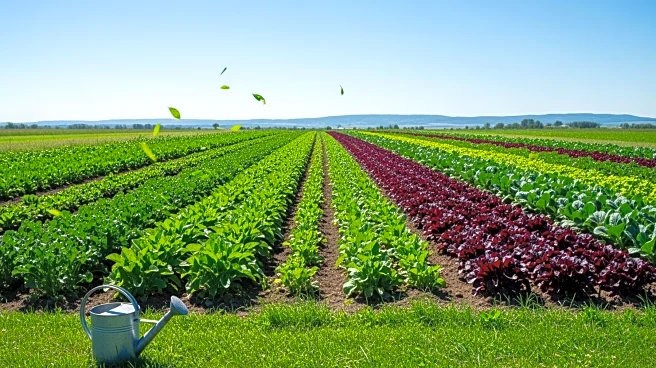What's Happening?
Embrapa and Nestlé Brazil have announced a strategic partnership aimed at advancing regenerative agriculture in Brazil. This collaboration, unveiled during the AgriZone event in Belém, focuses on developing sustainable technologies to reduce greenhouse
gas emissions in the milk and cocoa supply chains. The agreement includes two initial projects: one analyzing the emission profiles of lactating cows on different diets, and another focusing on agroforestry systems for sustainable cocoa cultivation. This initiative builds on a long-standing relationship between the two organizations, which began with the Good Practices Program on Dairy Farms in 2006. The partnership aims to integrate scientific research with practical field applications to promote decarbonization and enhance Brazil's role as a leader in sustainable agriculture.
Why It's Important?
The partnership between Embrapa and Nestlé Brazil is significant as it addresses the urgent need for sustainable agricultural practices in the face of climate change. By focusing on regenerative agriculture, the collaboration aims to create healthier and more resilient food systems, which is crucial for reducing the environmental impact of agriculture. This initiative not only supports Brazil's commitment to carbon neutrality by 2050 but also positions the country as a global leader in sustainable food production. The development of sustainable cocoa and low-carbon milk can serve as a model for other countries, potentially influencing global agricultural policies and practices. The partnership also highlights the importance of public-private collaborations in achieving sustainable development goals.
What's Next?
Moving forward, Embrapa and Nestlé Brazil plan to invest in genetic research and improved planting techniques to enhance productivity and carbon capture in the soil. The focus will be on expanding sustainable cocoa cultivation in the Amazon, reducing deforestation, and improving climate resilience. The creation of sustainability indicators will help measure the real impact of the practices adopted, providing a framework for scalable policies and production models. This partnership is expected to strengthen Brazil's image as a supplier of sustainable food with a low carbon footprint, potentially influencing international markets and encouraging other nations to adopt similar practices.
Beyond the Headlines
The partnership between Embrapa and Nestlé Brazil underscores the potential of regenerative agriculture to transform traditional farming practices. By integrating agroforestry systems and regenerative techniques, the initiative aims to restore soil health, enhance biodiversity, and ensure efficient water use. This approach not only benefits the environment but also supports the social and economic development of rural communities. The collaboration serves as a model for how scientific research and market experience can be combined to achieve productivity, competitiveness, and environmental responsibility. As the world grapples with the challenges of climate change, such initiatives could pave the way for a more sustainable and equitable global food system.















